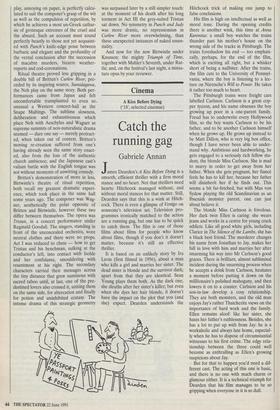Cinema
Catch the running gag
Gabriele Annan
James Dearden's A Kiss Before Dying is a smooth, efficient thriller with a firm moral stance and no heart. Not that thrillers need hearts: Hitchcock managed without, and without moral stances for that matter. Still, Dearden says that this is a wink at Hitch- cock. There is even a glimpse of Vertigo on someone's television set. Television pro- grammes ironically matched to the action are a running gag, but one has to be quick to catch them. The film is one of those films about films for people who know about films, though if you don't it doesn't matter, because it's still an effective thriller.
It is based on an unlikely story by Ira Levin (first filmed in 1956), about a man who kills a girl and marries her sister. The dead sister is blonde and the survivor dark; apart from that they are identical. Sean Young plays them both. As the dark one, she sleuths after her sister's killer; but even when she dyes her hair blonde, it doesn't have the impact on the plot that you (and she) expect. Dearden understands the Hitchcock trick of making one jump to false conclusions.
His film is high on intellectual as well as moral tone. During the opening credits there is another wink, this time at Anna Karenina: a small boy watches the trains thunder past his mother's house on the wrong side of the tracks in Pittsburgh. The trains foreshadow his end — too emphati- cally, perhaps, for the end of the film, which is exciting all right, but a whisker short of being a nailbiter. After the trains, the film cuts to the University of Pennsyl- vania, where the boy is listening to a lec- ture on Nietzsche's Will to Power. He takes it rather too much to heart.
The Pittsburgh trains were freight cars labelled Carlsson. Carlsson is a great cop- per tycoon, and his name obsesses the boy growing up poor in a one-parent family. Freud has to underwrite every Hollywood film, so the boy wants Carlsson to be his father, and to be another Carlsson himself when he grows up. He grows up instead to be Matt Dillon, who is very big box office, though I have never been able to under- stand why. Ambitious and hardworking, he gets engaged to a seriously rich fellow stu- dent, the blonde Miss Carlsson. She is mad to marry in order to get away from her father. When she gets pregnant, her fiancé feels he has to kill her, because her father will disinherit her if he finds out. This seems a bit far-fetched, but with Max von Sydow playing the old Scandinavian as an Ibsenish monster parent, one can just about believe it.
The blonde Miss Carlsson is frivolous. Her dark twin Ellen is caring: she wears jeans and works in a centre for young crack addicts. Like all good white girls, including Clarice in The Silence of the Lambs, she has a black best friend. The murderer changes his name from Jonathan to Jay, makes her fall in love with him and marries her after smarming his way into Mr Carlsson's good graces. There is brilliant, almost subliminal incident during the smarming process when he accepts a drink from Carlsson, hesitates a moment before putting it down on the milllionaire's polished mahogany, and then lowers it on to a coaster. Carlsson and his son-in-law develop a cosy relationship. They are both monsters, and the old man enjoys Jay's rather Thatcherite views on the importance of hard work and the family. Ellen remains aloof: like her sister, she hates her father's ruthlessness. Besides, she has a lot to put up with from Jay: he is a workaholic and always late home, especial- ly when he has to dispose of circumstantial witnesses to his first crime. The edgy rela- tionship between the three could well become as enthralling as Ellen's growing suspicions about Jay.
But for that to happen you'd need a dif- ferent cast. The acting of this one is basic, and there is no one with much charm or glamour either. It is a technical triumph for Dearden that his film manages to be so gripping when everyone in it is so dull.


























































 Previous page
Previous page